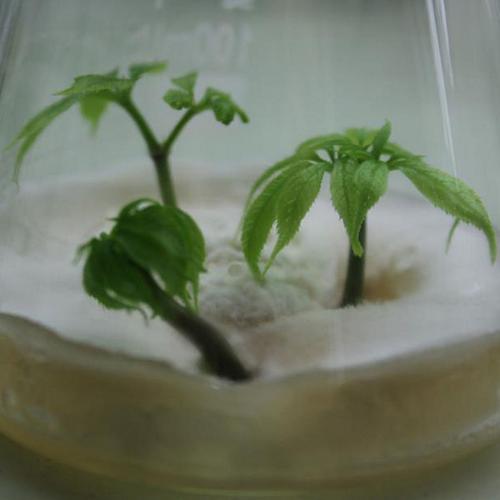当前位置:
X-MOL 学术
›
J. Integr. Plant Biol.
›
论文详情
Our official English website, www.x-mol.net, welcomes your feedback! (Note: you will need to create a separate account there.)
Colonization of endophyte Acremonium sp. D212 in Panax notoginseng and rice mediated by auxin and jasmonic acid.
Journal of Integrative Plant Biology ( IF 11.4 ) Pub Date : 2020-02-26 , DOI: 10.1111/jipb.12905 Li Han 1, 2, 3 , Xuan Zhou 1, 2, 3 , Yiting Zhao 1, 2, 3, 4 , Shusheng Zhu 1, 2, 3 , Lixia Wu 1, 2, 3 , Yunlu He 1 , Xiangrui Ping 1 , Xinqi Lu 1 , Wuying Huang 1 , Jie Qian 1 , Lina Zhang 1 , Xi Jiang 1 , Dan Zhu 1 , Chongyu Luo 1, 2, 3 , Saijie Li 1 , Qian Dong 1 , Qijing Fu 1, 2, 3 , Kaiyuan Deng 5 , Xin Wang 1 , Lei Wang 6 , Sheng Peng 1, 2, 3 , Jinsong Wu 6 , Weimin Li 7 , Jiří Friml 8 , Youyong Zhu 1, 2, 3 , Xiahong He 1, 2, 3, 9 , Yunlong Du 1, 2, 3
Journal of Integrative Plant Biology ( IF 11.4 ) Pub Date : 2020-02-26 , DOI: 10.1111/jipb.12905 Li Han 1, 2, 3 , Xuan Zhou 1, 2, 3 , Yiting Zhao 1, 2, 3, 4 , Shusheng Zhu 1, 2, 3 , Lixia Wu 1, 2, 3 , Yunlu He 1 , Xiangrui Ping 1 , Xinqi Lu 1 , Wuying Huang 1 , Jie Qian 1 , Lina Zhang 1 , Xi Jiang 1 , Dan Zhu 1 , Chongyu Luo 1, 2, 3 , Saijie Li 1 , Qian Dong 1 , Qijing Fu 1, 2, 3 , Kaiyuan Deng 5 , Xin Wang 1 , Lei Wang 6 , Sheng Peng 1, 2, 3 , Jinsong Wu 6 , Weimin Li 7 , Jiří Friml 8 , Youyong Zhu 1, 2, 3 , Xiahong He 1, 2, 3, 9 , Yunlong Du 1, 2, 3
Affiliation

|
Endophytic fungi can be beneficial to plant growth. However, the molecular mechanisms underlying colonization of Acremonium spp. remain unclear. In this study, a novel endophytic Acremonium strain was isolated from the buds of Panax notoginseng and named Acremonium sp. D212. The Acremonium sp. D212 could colonize the roots of P. notoginseng, enhance the resistance of P. notoginseng to root rot disease, and promote root growth and saponin biosynthesis in P. notoginseng. Acremonium sp. D212 could secrete indole‐3‐acetic acid (IAA) and jasmonic acid (JA), and inoculation with the fungus increased the endogenous levels of IAA and JA in P. notoginseng. Colonization of the Acremonium sp. D212 in the roots of the rice line Nipponbare was dependent on the concentration of methyl jasmonate (MeJA) (2–15 μmol/L) and 1‐naphthalenacetic acid (NAA) (10–20 μmol/L). Moreover, the roots of the JA signaling‐defective coi1‐18 mutant were colonized by Acremonium sp. D212 to a lesser degree than those of the wild‐type Nipponbare and miR393b‐overexpressing lines, and the colonization was rescued by MeJA but not by NAA. It suggests that the cross‐talk between JA signaling and the auxin biosynthetic pathway plays a crucial role in the colonization of Acremonium sp. D212 in host plants.
中文翻译:

内生真菌Acremonium sp。的定殖。人参和茉莉酸介导的三七和水稻中的D212。
内生真菌可能对植物生长有益。然而,潜在的分子机制在顶头属菌属的殖民。仍不清楚。在这项研究中,从三七的芽中分离出一种新的内生顶头孢霉菌株,并命名为顶头孢霉。D212。在枝顶藻。D212可以在三七的根部定植,增强三七对根腐病的抵抗力,促进三七的根生长和皂苷的生物合成。顶头孢霉sp。D212可以分泌吲哚-3-乙酸(IAA)和茉莉酸(JA),并且接种真菌会增加三七中IAA和JA的内源性水平。Acremonium sp。的定殖。粳稻粳稻根系中的D212依赖于茉莉酸甲酯(MeJA)(2-15μmol/ L)和1-萘乙酸(NAA)(10-20μmol/ L)的浓度。此外,JA信令缺陷的根源coi1-18突变体被定植枝顶孢sp。D212的程度要低于野生型Nipponbare和过表达miR393b的系,并且定殖是由MeJA而非NAA拯救的。这表明JA信号传导和植物生长素生物合成途径之间的串扰在Acremonium sp的定殖中起着至关重要的作用。宿主植物中的D212。
更新日期:2020-02-26
中文翻译:

内生真菌Acremonium sp。的定殖。人参和茉莉酸介导的三七和水稻中的D212。
内生真菌可能对植物生长有益。然而,潜在的分子机制在顶头属菌属的殖民。仍不清楚。在这项研究中,从三七的芽中分离出一种新的内生顶头孢霉菌株,并命名为顶头孢霉。D212。在枝顶藻。D212可以在三七的根部定植,增强三七对根腐病的抵抗力,促进三七的根生长和皂苷的生物合成。顶头孢霉sp。D212可以分泌吲哚-3-乙酸(IAA)和茉莉酸(JA),并且接种真菌会增加三七中IAA和JA的内源性水平。Acremonium sp。的定殖。粳稻粳稻根系中的D212依赖于茉莉酸甲酯(MeJA)(2-15μmol/ L)和1-萘乙酸(NAA)(10-20μmol/ L)的浓度。此外,JA信令缺陷的根源coi1-18突变体被定植枝顶孢sp。D212的程度要低于野生型Nipponbare和过表达miR393b的系,并且定殖是由MeJA而非NAA拯救的。这表明JA信号传导和植物生长素生物合成途径之间的串扰在Acremonium sp的定殖中起着至关重要的作用。宿主植物中的D212。



























 京公网安备 11010802027423号
京公网安备 11010802027423号